Exploring Categorical Imperatives: A Philosophical Examination
VerifiedAdded on 2022/09/16
|5
|1253
|27
Essay
AI Summary
This essay delves into Immanuel Kant's philosophy, specifically focusing on his concept of Categorical Imperatives, a cornerstone of Kantian ethics and deontology. The essay begins by introducing Kant and his significance in Western philosophy, emphasizing his contributions to epistemology, metaphysics, aesthetics, and ethics. It then explains deontology as a normative ethical theory, contrasting it with consequentialism and virtue ethics. The core of the essay lies in the detailed explanation of Categorical Imperatives, which Kant defines as unconditional moral requirements derived from reason. The essay examines the first formulation (universal law), the second formulation (treating humanity as an end), and the third formulation (autonomy). A contemporary maxim, "The fundamental rights of an individual should not be violated," is then presented as an example of how to apply Kant's principles in the modern world, demonstrating its adherence to the three formulations of the Categorical Imperatives. Finally, the essay concludes by establishing the importance of Kant's philosophical contributions and the applicability of the Categorical Imperatives in contemporary society.
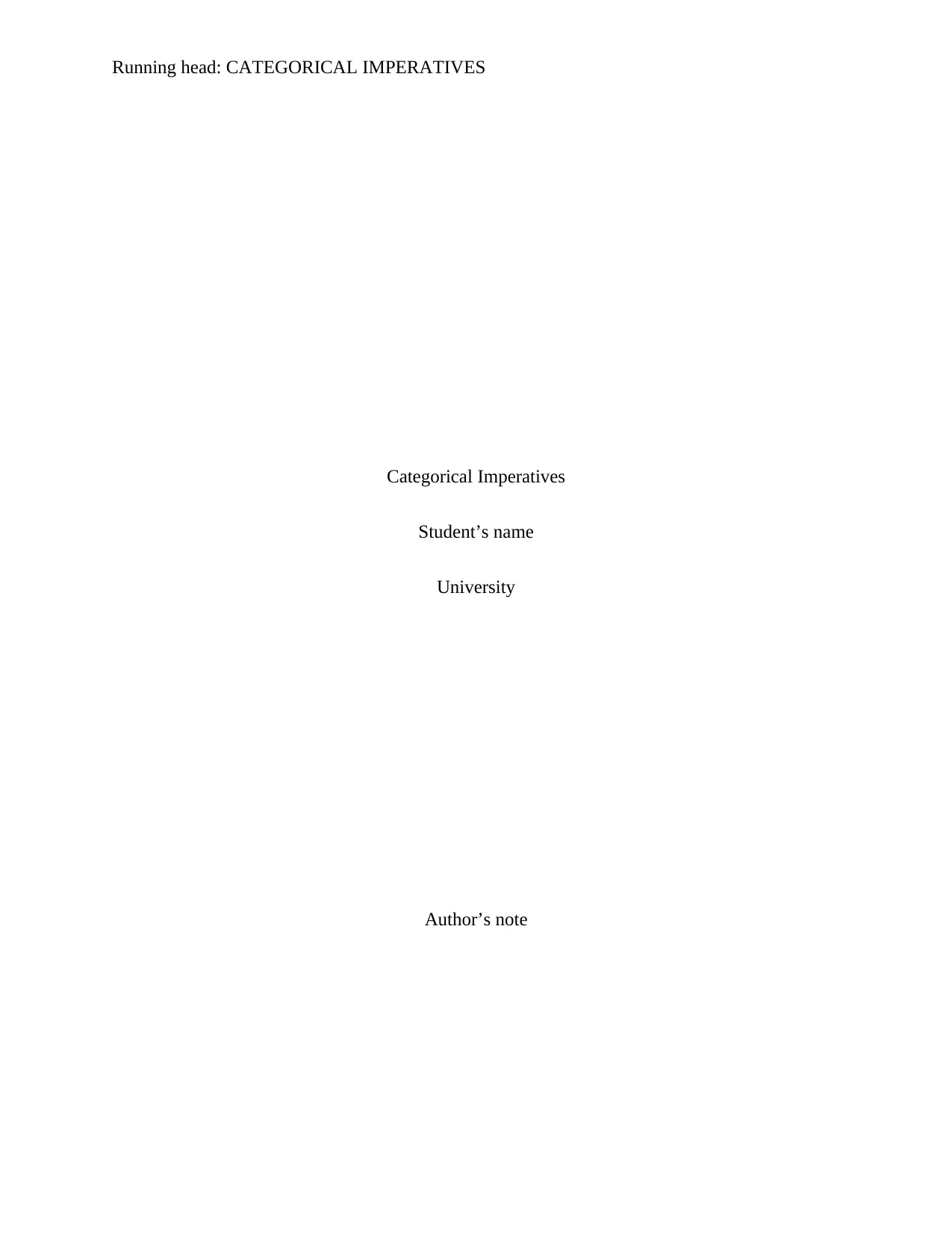
Running head: CATEGORICAL IMPERATIVES
Categorical Imperatives
Student’s name
University
Author’s note
Categorical Imperatives
Student’s name
University
Author’s note
Paraphrase This Document
Need a fresh take? Get an instant paraphrase of this document with our AI Paraphraser
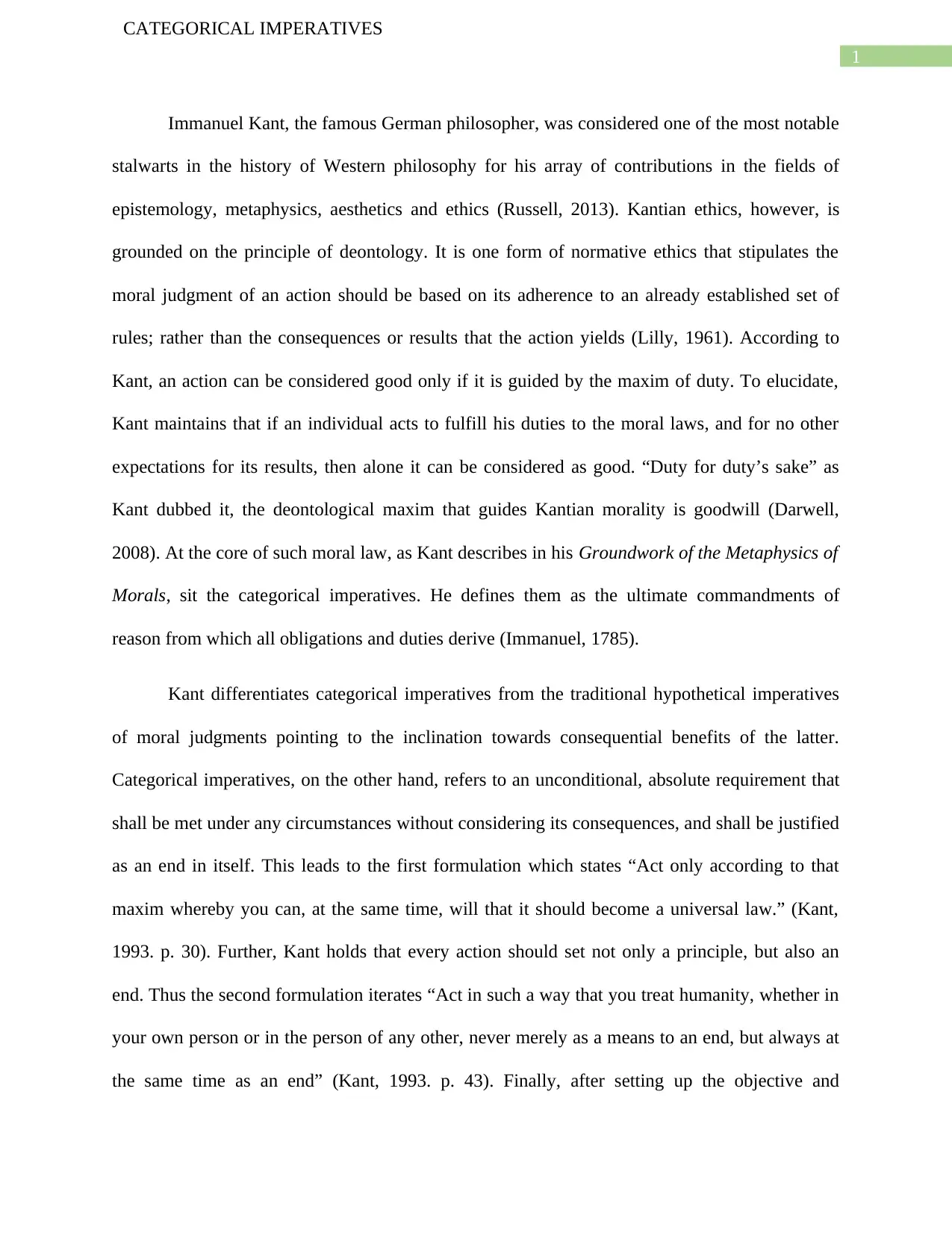
1
CATEGORICAL IMPERATIVES
Immanuel Kant, the famous German philosopher, was considered one of the most notable
stalwarts in the history of Western philosophy for his array of contributions in the fields of
epistemology, metaphysics, aesthetics and ethics (Russell, 2013). Kantian ethics, however, is
grounded on the principle of deontology. It is one form of normative ethics that stipulates the
moral judgment of an action should be based on its adherence to an already established set of
rules; rather than the consequences or results that the action yields (Lilly, 1961). According to
Kant, an action can be considered good only if it is guided by the maxim of duty. To elucidate,
Kant maintains that if an individual acts to fulfill his duties to the moral laws, and for no other
expectations for its results, then alone it can be considered as good. “Duty for duty’s sake” as
Kant dubbed it, the deontological maxim that guides Kantian morality is goodwill (Darwell,
2008). At the core of such moral law, as Kant describes in his Groundwork of the Metaphysics of
Morals, sit the categorical imperatives. He defines them as the ultimate commandments of
reason from which all obligations and duties derive (Immanuel, 1785).
Kant differentiates categorical imperatives from the traditional hypothetical imperatives
of moral judgments pointing to the inclination towards consequential benefits of the latter.
Categorical imperatives, on the other hand, refers to an unconditional, absolute requirement that
shall be met under any circumstances without considering its consequences, and shall be justified
as an end in itself. This leads to the first formulation which states “Act only according to that
maxim whereby you can, at the same time, will that it should become a universal law.” (Kant,
1993. p. 30). Further, Kant holds that every action should set not only a principle, but also an
end. Thus the second formulation iterates “Act in such a way that you treat humanity, whether in
your own person or in the person of any other, never merely as a means to an end, but always at
the same time as an end” (Kant, 1993. p. 43). Finally, after setting up the objective and
CATEGORICAL IMPERATIVES
Immanuel Kant, the famous German philosopher, was considered one of the most notable
stalwarts in the history of Western philosophy for his array of contributions in the fields of
epistemology, metaphysics, aesthetics and ethics (Russell, 2013). Kantian ethics, however, is
grounded on the principle of deontology. It is one form of normative ethics that stipulates the
moral judgment of an action should be based on its adherence to an already established set of
rules; rather than the consequences or results that the action yields (Lilly, 1961). According to
Kant, an action can be considered good only if it is guided by the maxim of duty. To elucidate,
Kant maintains that if an individual acts to fulfill his duties to the moral laws, and for no other
expectations for its results, then alone it can be considered as good. “Duty for duty’s sake” as
Kant dubbed it, the deontological maxim that guides Kantian morality is goodwill (Darwell,
2008). At the core of such moral law, as Kant describes in his Groundwork of the Metaphysics of
Morals, sit the categorical imperatives. He defines them as the ultimate commandments of
reason from which all obligations and duties derive (Immanuel, 1785).
Kant differentiates categorical imperatives from the traditional hypothetical imperatives
of moral judgments pointing to the inclination towards consequential benefits of the latter.
Categorical imperatives, on the other hand, refers to an unconditional, absolute requirement that
shall be met under any circumstances without considering its consequences, and shall be justified
as an end in itself. This leads to the first formulation which states “Act only according to that
maxim whereby you can, at the same time, will that it should become a universal law.” (Kant,
1993. p. 30). Further, Kant holds that every action should set not only a principle, but also an
end. Thus the second formulation iterates “Act in such a way that you treat humanity, whether in
your own person or in the person of any other, never merely as a means to an end, but always at
the same time as an end” (Kant, 1993. p. 43). Finally, after setting up the objective and
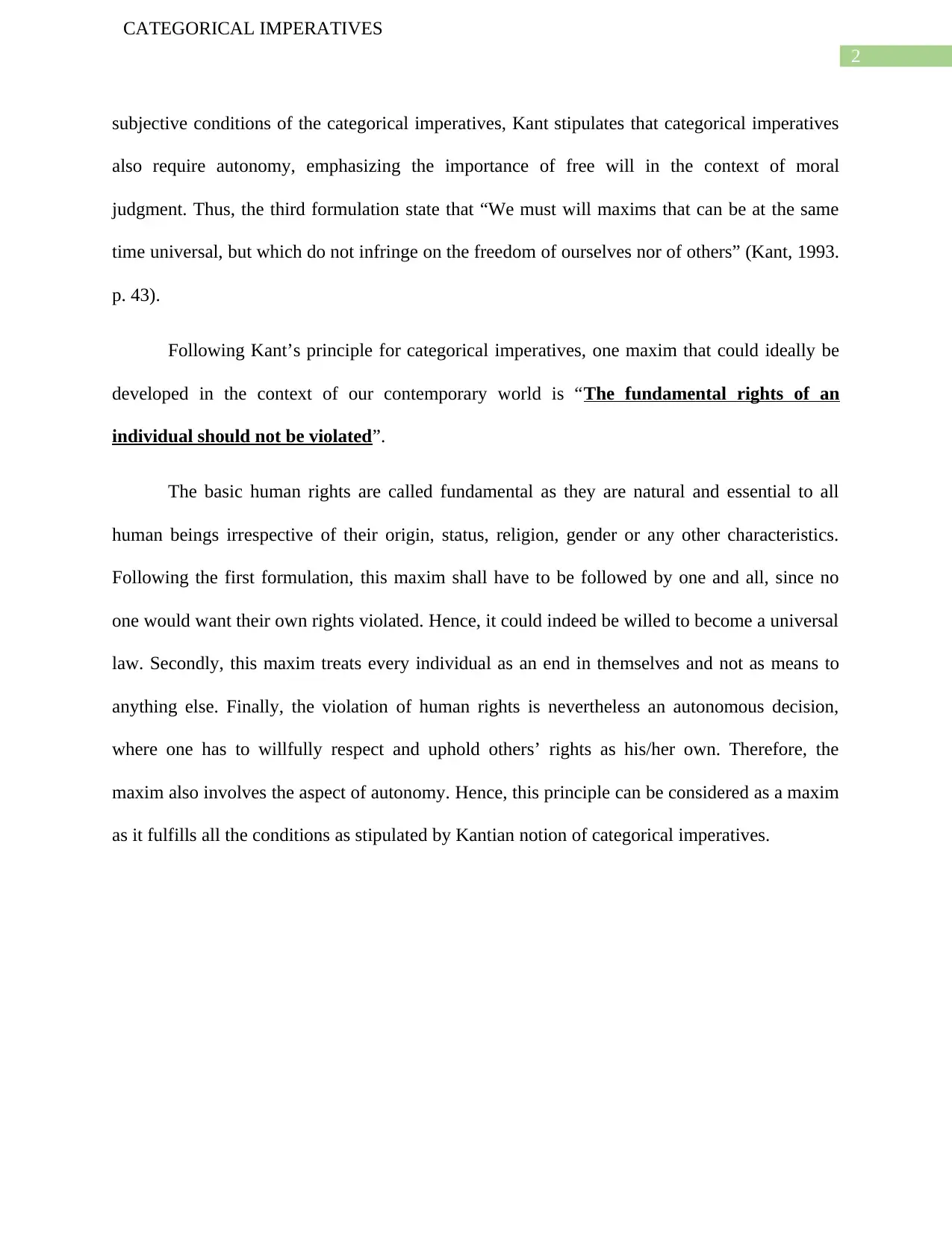
2
CATEGORICAL IMPERATIVES
subjective conditions of the categorical imperatives, Kant stipulates that categorical imperatives
also require autonomy, emphasizing the importance of free will in the context of moral
judgment. Thus, the third formulation state that “We must will maxims that can be at the same
time universal, but which do not infringe on the freedom of ourselves nor of others” (Kant, 1993.
p. 43).
Following Kant’s principle for categorical imperatives, one maxim that could ideally be
developed in the context of our contemporary world is “The fundamental rights of an
individual should not be violated”.
The basic human rights are called fundamental as they are natural and essential to all
human beings irrespective of their origin, status, religion, gender or any other characteristics.
Following the first formulation, this maxim shall have to be followed by one and all, since no
one would want their own rights violated. Hence, it could indeed be willed to become a universal
law. Secondly, this maxim treats every individual as an end in themselves and not as means to
anything else. Finally, the violation of human rights is nevertheless an autonomous decision,
where one has to willfully respect and uphold others’ rights as his/her own. Therefore, the
maxim also involves the aspect of autonomy. Hence, this principle can be considered as a maxim
as it fulfills all the conditions as stipulated by Kantian notion of categorical imperatives.
CATEGORICAL IMPERATIVES
subjective conditions of the categorical imperatives, Kant stipulates that categorical imperatives
also require autonomy, emphasizing the importance of free will in the context of moral
judgment. Thus, the third formulation state that “We must will maxims that can be at the same
time universal, but which do not infringe on the freedom of ourselves nor of others” (Kant, 1993.
p. 43).
Following Kant’s principle for categorical imperatives, one maxim that could ideally be
developed in the context of our contemporary world is “The fundamental rights of an
individual should not be violated”.
The basic human rights are called fundamental as they are natural and essential to all
human beings irrespective of their origin, status, religion, gender or any other characteristics.
Following the first formulation, this maxim shall have to be followed by one and all, since no
one would want their own rights violated. Hence, it could indeed be willed to become a universal
law. Secondly, this maxim treats every individual as an end in themselves and not as means to
anything else. Finally, the violation of human rights is nevertheless an autonomous decision,
where one has to willfully respect and uphold others’ rights as his/her own. Therefore, the
maxim also involves the aspect of autonomy. Hence, this principle can be considered as a maxim
as it fulfills all the conditions as stipulated by Kantian notion of categorical imperatives.
⊘ This is a preview!⊘
Do you want full access?
Subscribe today to unlock all pages.

Trusted by 1+ million students worldwide
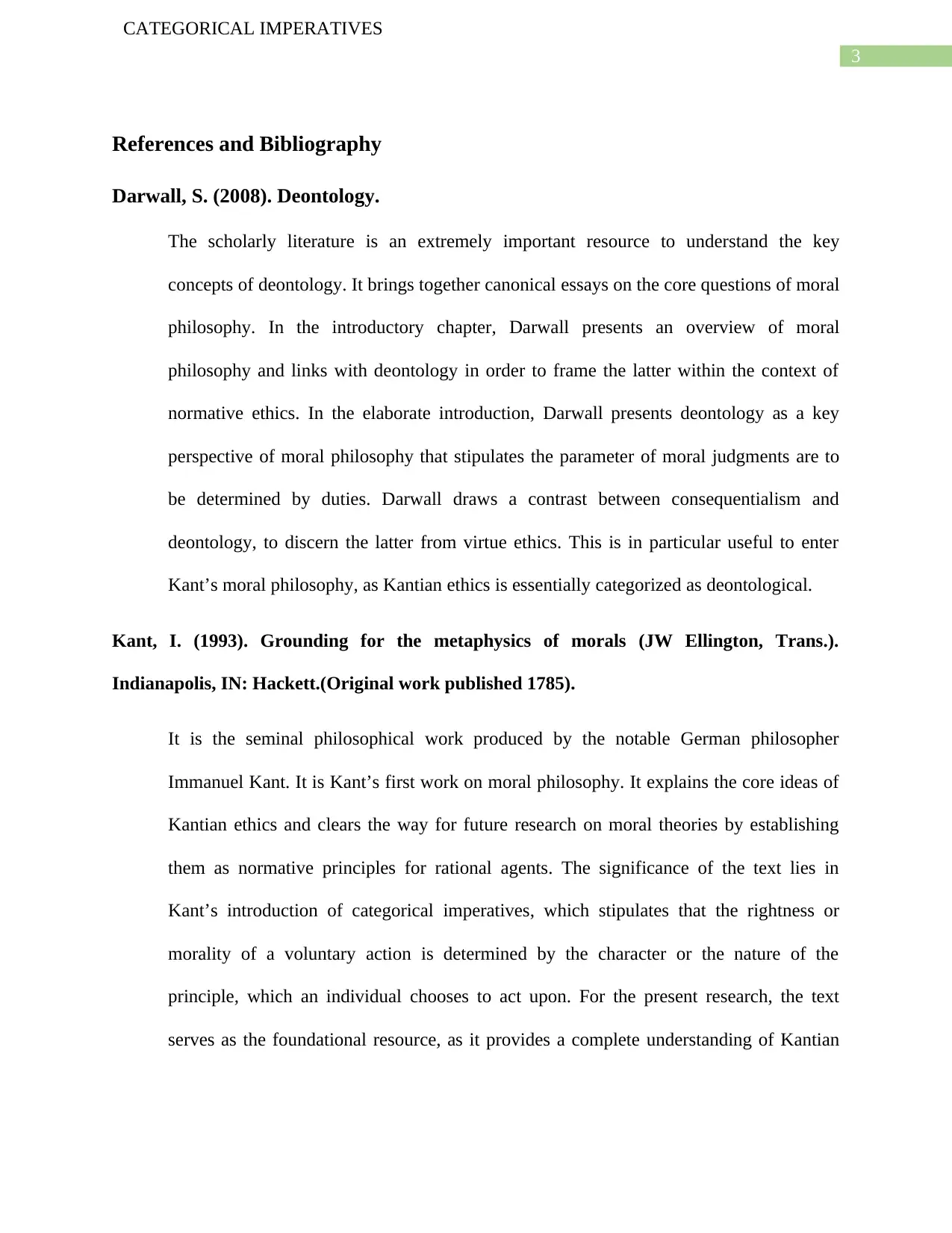
3
CATEGORICAL IMPERATIVES
References and Bibliography
Darwall, S. (2008). Deontology.
The scholarly literature is an extremely important resource to understand the key
concepts of deontology. It brings together canonical essays on the core questions of moral
philosophy. In the introductory chapter, Darwall presents an overview of moral
philosophy and links with deontology in order to frame the latter within the context of
normative ethics. In the elaborate introduction, Darwall presents deontology as a key
perspective of moral philosophy that stipulates the parameter of moral judgments are to
be determined by duties. Darwall draws a contrast between consequentialism and
deontology, to discern the latter from virtue ethics. This is in particular useful to enter
Kant’s moral philosophy, as Kantian ethics is essentially categorized as deontological.
Kant, I. (1993). Grounding for the metaphysics of morals (JW Ellington, Trans.).
Indianapolis, IN: Hackett.(Original work published 1785).
It is the seminal philosophical work produced by the notable German philosopher
Immanuel Kant. It is Kant’s first work on moral philosophy. It explains the core ideas of
Kantian ethics and clears the way for future research on moral theories by establishing
them as normative principles for rational agents. The significance of the text lies in
Kant’s introduction of categorical imperatives, which stipulates that the rightness or
morality of a voluntary action is determined by the character or the nature of the
principle, which an individual chooses to act upon. For the present research, the text
serves as the foundational resource, as it provides a complete understanding of Kantian
CATEGORICAL IMPERATIVES
References and Bibliography
Darwall, S. (2008). Deontology.
The scholarly literature is an extremely important resource to understand the key
concepts of deontology. It brings together canonical essays on the core questions of moral
philosophy. In the introductory chapter, Darwall presents an overview of moral
philosophy and links with deontology in order to frame the latter within the context of
normative ethics. In the elaborate introduction, Darwall presents deontology as a key
perspective of moral philosophy that stipulates the parameter of moral judgments are to
be determined by duties. Darwall draws a contrast between consequentialism and
deontology, to discern the latter from virtue ethics. This is in particular useful to enter
Kant’s moral philosophy, as Kantian ethics is essentially categorized as deontological.
Kant, I. (1993). Grounding for the metaphysics of morals (JW Ellington, Trans.).
Indianapolis, IN: Hackett.(Original work published 1785).
It is the seminal philosophical work produced by the notable German philosopher
Immanuel Kant. It is Kant’s first work on moral philosophy. It explains the core ideas of
Kantian ethics and clears the way for future research on moral theories by establishing
them as normative principles for rational agents. The significance of the text lies in
Kant’s introduction of categorical imperatives, which stipulates that the rightness or
morality of a voluntary action is determined by the character or the nature of the
principle, which an individual chooses to act upon. For the present research, the text
serves as the foundational resource, as it provides a complete understanding of Kantian
Paraphrase This Document
Need a fresh take? Get an instant paraphrase of this document with our AI Paraphraser
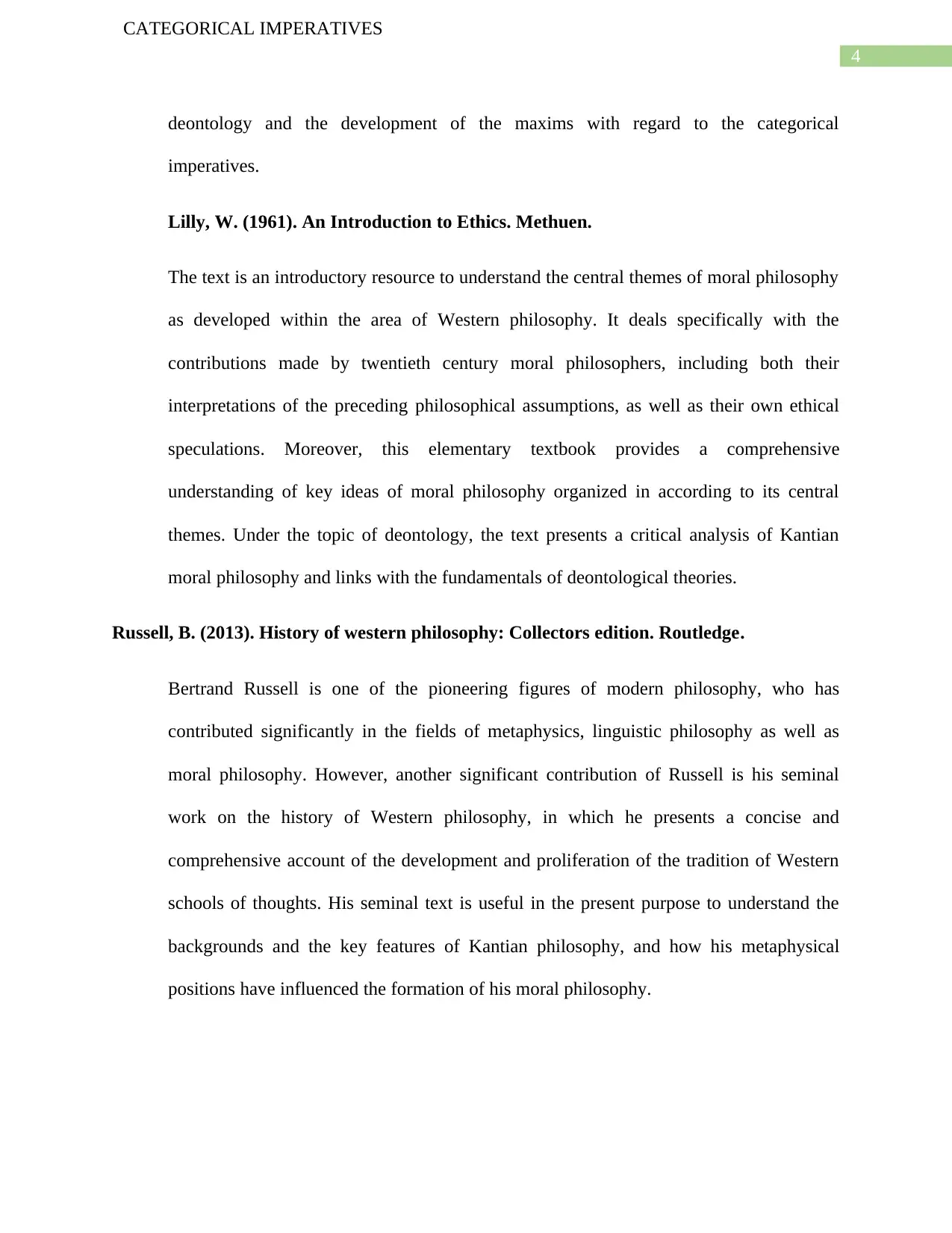
4
CATEGORICAL IMPERATIVES
deontology and the development of the maxims with regard to the categorical
imperatives.
Lilly, W. (1961). An Introduction to Ethics. Methuen.
The text is an introductory resource to understand the central themes of moral philosophy
as developed within the area of Western philosophy. It deals specifically with the
contributions made by twentieth century moral philosophers, including both their
interpretations of the preceding philosophical assumptions, as well as their own ethical
speculations. Moreover, this elementary textbook provides a comprehensive
understanding of key ideas of moral philosophy organized in according to its central
themes. Under the topic of deontology, the text presents a critical analysis of Kantian
moral philosophy and links with the fundamentals of deontological theories.
Russell, B. (2013). History of western philosophy: Collectors edition. Routledge.
Bertrand Russell is one of the pioneering figures of modern philosophy, who has
contributed significantly in the fields of metaphysics, linguistic philosophy as well as
moral philosophy. However, another significant contribution of Russell is his seminal
work on the history of Western philosophy, in which he presents a concise and
comprehensive account of the development and proliferation of the tradition of Western
schools of thoughts. His seminal text is useful in the present purpose to understand the
backgrounds and the key features of Kantian philosophy, and how his metaphysical
positions have influenced the formation of his moral philosophy.
CATEGORICAL IMPERATIVES
deontology and the development of the maxims with regard to the categorical
imperatives.
Lilly, W. (1961). An Introduction to Ethics. Methuen.
The text is an introductory resource to understand the central themes of moral philosophy
as developed within the area of Western philosophy. It deals specifically with the
contributions made by twentieth century moral philosophers, including both their
interpretations of the preceding philosophical assumptions, as well as their own ethical
speculations. Moreover, this elementary textbook provides a comprehensive
understanding of key ideas of moral philosophy organized in according to its central
themes. Under the topic of deontology, the text presents a critical analysis of Kantian
moral philosophy and links with the fundamentals of deontological theories.
Russell, B. (2013). History of western philosophy: Collectors edition. Routledge.
Bertrand Russell is one of the pioneering figures of modern philosophy, who has
contributed significantly in the fields of metaphysics, linguistic philosophy as well as
moral philosophy. However, another significant contribution of Russell is his seminal
work on the history of Western philosophy, in which he presents a concise and
comprehensive account of the development and proliferation of the tradition of Western
schools of thoughts. His seminal text is useful in the present purpose to understand the
backgrounds and the key features of Kantian philosophy, and how his metaphysical
positions have influenced the formation of his moral philosophy.
1 out of 5
Related Documents
Your All-in-One AI-Powered Toolkit for Academic Success.
+13062052269
info@desklib.com
Available 24*7 on WhatsApp / Email
![[object Object]](/_next/static/media/star-bottom.7253800d.svg)
Unlock your academic potential
Copyright © 2020–2026 A2Z Services. All Rights Reserved. Developed and managed by ZUCOL.





